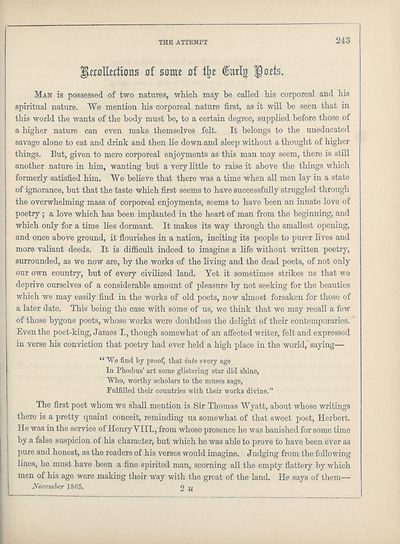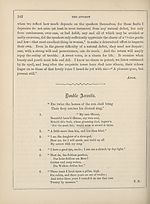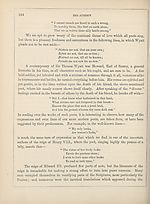Attempt > Volume 1 and Select writings
(255) Page 243
Download files
Complete book:
Individual page:
Thumbnail gallery: Grid view | List view

THE ATTEMPT
243
^aoIUrtrotts of sonu of €arlg f offa.
Man is possessed of two natures, which may he called his corporeal and his
spiritual nature. "We mention his corporeal nature first, as it will be seen that in
this world the wants of the body must be, to a certain degree, supplied before those of
a higher nature can even make themselves felt. It belongs to the uneducated
savage alone to eat and drink and then lie down and sleep without a thought of higher
things. But, given to mere corporeal enjoyments as this man may seem, there is still
another nature in him, wanting but a very little to raise it above the things which
formerly satisfied him. We believe that there was a time when all men lay in a state
of ignorance, but that the taste which first seems to have successfully struggled through
the overwhelming mass of corporeal enjoyments, seems to have been an innate love of
poetry; a love which has been implanted in the heart of man from the beginning, and
which only for a time lies dormant. It makes its way through the smallest opening,
and once above ground, it flourishes in a nation, inciting its people to purer lives and
more valiant deeds. It is difficult indeed to imagine a life without written poetry,
surrounded, as we now are, by the works of the living and the dead poets, of not only
our own country, but of every civilized land. Yet it sometimes strikes us that we
deprive ourselves of a considerable amount of pleasure by not seeking for the beauties
which we may easily find in the works of old poets, now almost forsaken for those of
a later date. This being the case with some of us, we think that we may recall a few
of those bygone poets, whose works were doubtless the delight of their contemporaries.
Even the poet-king, James I., though somewhat of an affected writer, felt and expressed
in verse his conviction that poetry had ever held a high place in the world, saying—
“We find by proof, that into every age
In Phoebus’ art some glistering star did shine,
Who, worthy scholars to the muses sage,
Fulfilled their countries with their works divine.”
The first poet whom we shall mention is Sir Thomas "Wyatt, about whose writings
there is a pretty quaint conceit, reminding us somewhat of that sweet poet, Herbert.
He was in the service of Henry YIII., from whose presence he was banished for some time
by a false suspicion of his character, but which he was able to prove to have been ever as
pure and honest, as the readers of his verses would imagine. Judging from the following
lines, he must have been a fine spirited man, scorning all the empty flattery by which
men of his age were making their way with the great of the land. He says of them—
November 1865. 2 H
243
^aoIUrtrotts of sonu of €arlg f offa.
Man is possessed of two natures, which may he called his corporeal and his
spiritual nature. "We mention his corporeal nature first, as it will be seen that in
this world the wants of the body must be, to a certain degree, supplied before those of
a higher nature can even make themselves felt. It belongs to the uneducated
savage alone to eat and drink and then lie down and sleep without a thought of higher
things. But, given to mere corporeal enjoyments as this man may seem, there is still
another nature in him, wanting but a very little to raise it above the things which
formerly satisfied him. We believe that there was a time when all men lay in a state
of ignorance, but that the taste which first seems to have successfully struggled through
the overwhelming mass of corporeal enjoyments, seems to have been an innate love of
poetry; a love which has been implanted in the heart of man from the beginning, and
which only for a time lies dormant. It makes its way through the smallest opening,
and once above ground, it flourishes in a nation, inciting its people to purer lives and
more valiant deeds. It is difficult indeed to imagine a life without written poetry,
surrounded, as we now are, by the works of the living and the dead poets, of not only
our own country, but of every civilized land. Yet it sometimes strikes us that we
deprive ourselves of a considerable amount of pleasure by not seeking for the beauties
which we may easily find in the works of old poets, now almost forsaken for those of
a later date. This being the case with some of us, we think that we may recall a few
of those bygone poets, whose works were doubtless the delight of their contemporaries.
Even the poet-king, James I., though somewhat of an affected writer, felt and expressed
in verse his conviction that poetry had ever held a high place in the world, saying—
“We find by proof, that into every age
In Phoebus’ art some glistering star did shine,
Who, worthy scholars to the muses sage,
Fulfilled their countries with their works divine.”
The first poet whom we shall mention is Sir Thomas "Wyatt, about whose writings
there is a pretty quaint conceit, reminding us somewhat of that sweet poet, Herbert.
He was in the service of Henry YIII., from whose presence he was banished for some time
by a false suspicion of his character, but which he was able to prove to have been ever as
pure and honest, as the readers of his verses would imagine. Judging from the following
lines, he must have been a fine spirited man, scorning all the empty flattery by which
men of his age were making their way with the great of the land. He says of them—
November 1865. 2 H
Set display mode to: Large image | Transcription
Images and transcriptions on this page, including medium image downloads, may be used under the Creative Commons Attribution 4.0 International Licence unless otherwise stated. ![]()
| Ladies' Edinburgh Debating Society publications > Attempt > Volume 1 and Select writings > (255) Page 243 |
|---|
| Permanent URL | https://digital.nls.uk/109868014 |
|---|
| Attribution and copyright: |
|
|---|

